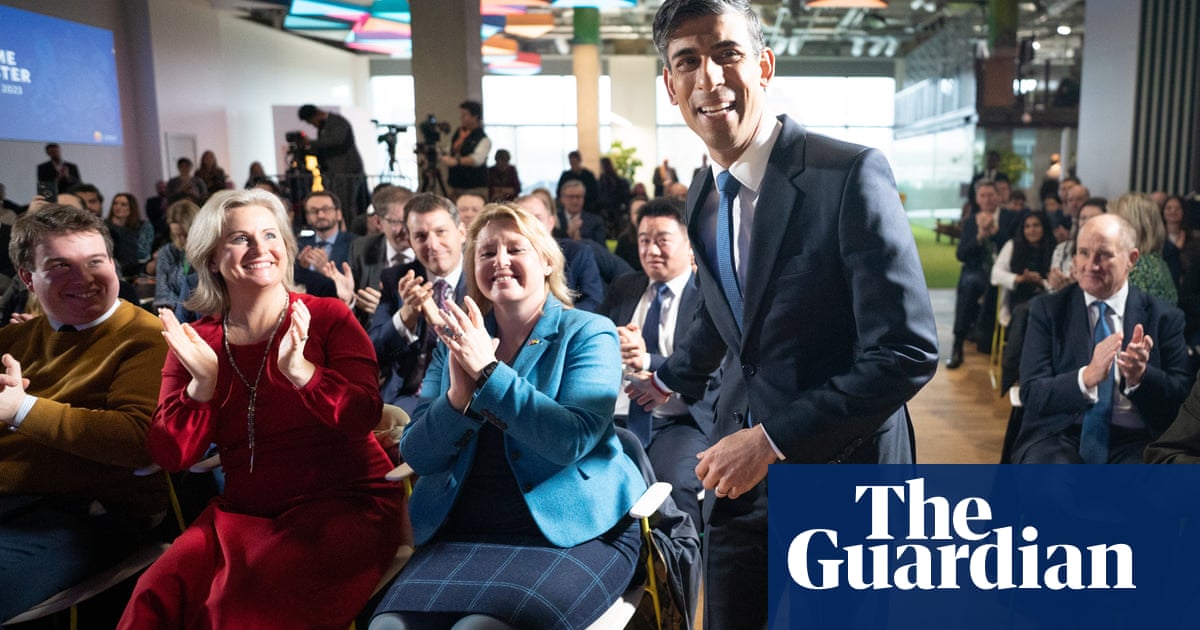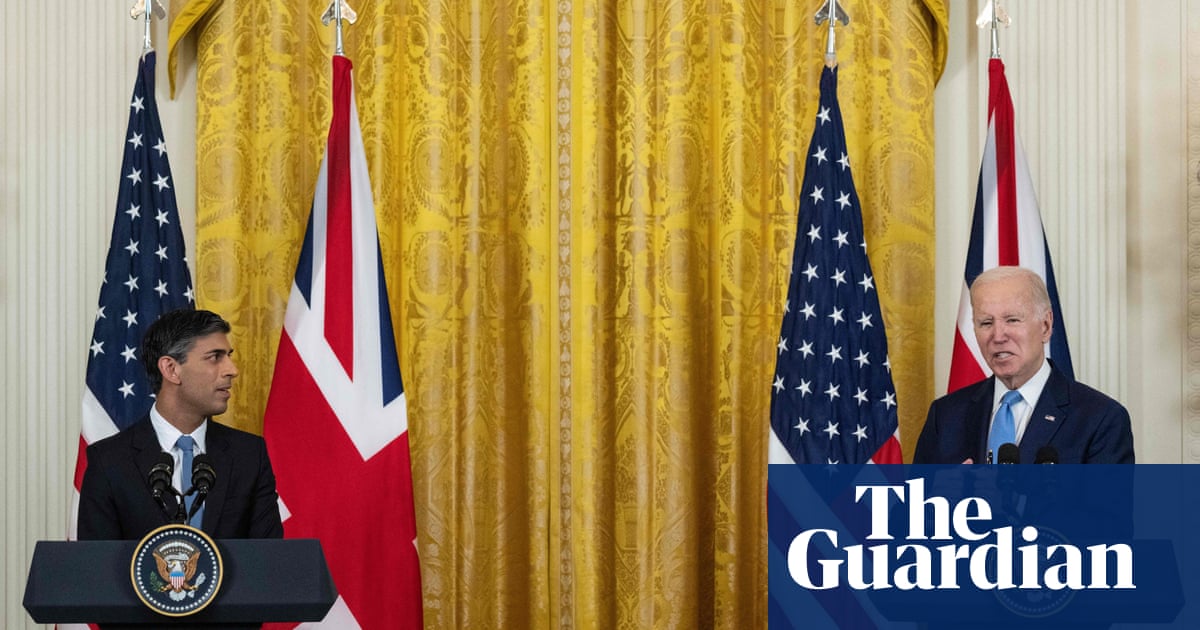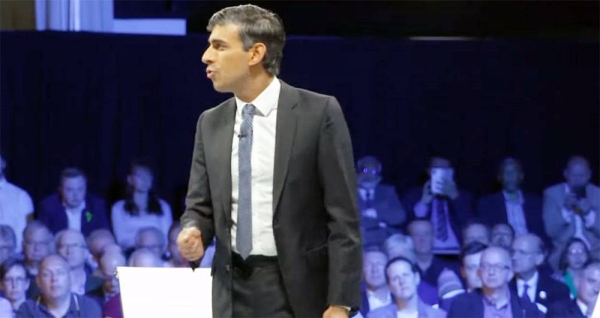
Rishi Sunak has asked the public to judge him on results as he revealed his strategy for the run-up to the next general election, hinting at pay rises in the public sector next year and vowing to get the economy growing.
The prime minister staked his premiership on a five-point plan to get through to polling day, expected in the autumn next year, admitting that the government could then be judged to be “delivering for you or not”.
He vowed there would be “no tricks” and “no ambiguity” but set out little detail on policy and refused to give a timescale for any of the promises apart from halving inflation, in his first major speech since entering No 10.
His other pledges as he seeks to regain the Conservatives’ authority with the public after a chaotic year are growing the economy, making sure national debt is falling, cutting NHS waiting lists and passing new laws to stop small boats crossing the Channel.
Describing the five promises as the “people’s priorities”, he said: “No tricks. No ambiguity. We’re either delivering for you or we’re not. We will rebuild trust in politics though action or not at all. So I ask you to judge us on the effort we put in and the results we achieve.”
Sunak appeared to acknowledge that his time in Downing Street was likely to be defined by his handling of a series of crises including the cost of living, the state of the NHS, strikes and small boat crossings, but he vowed to give the public “peace of mind”.
With the country in the grip of widespread industrial action, including across the NHS and the transport network, he hinted that pay deals could be on the table for next year, but only if unions called off planned strikes for this winter – prompting No 10 insiders to clarify that he was not setting an ultimatum.
Sunak said: “We’re about to start a new process for pay for [next] year. That’s exactly the kind of thing that we should be sitting down and talking to the unions about before everyone submits evidence to that independent process, to understand where we’re all coming from.”
He said the government would be setting out further plans on next year’s pay settlements “in the coming days”, but he doubled down on his refusal to reopen this year’s pay negotiations, saying the demands were unaffordable, with Downing Street officials also ruling out compromises on pensions or bonuses this year.
There was little detail from the prime minister on plans for anti-strike legislation, which is expected to bring in minimum service requirements but could run into trouble in the House of Lords and courts, but he promised to say more in “the coming days”.
Sunak’s hastily arranged speech in Stratford, east London, came 24 hours before Keir Starmer gives his own new year address, pledging that Labour will not open the “big government chequebook” in an attempt to repair Britain’s faltering public services if it wins the next election.
The Labour leader will set out his principles for government and promise “a decade of national renewal”. But he will deny that the country’s problems can be fixed by more spending, even as doctors say the NHS is in crisis and strikes bring a number of public services to their knees.Sunak also faces challenges from within his own divided party, with the Conservative MP Nadine Dorries tweeting angrily that Sunak had “washed down the drain” three years of Tory pledges including on levelling up and social care reform.
The former cabinet minister, a close ally of Boris Johnson, wrote: “Where is the mandate – who voted for this? Will now be almost impossible to face the electorate at a GE [general election] and expect voters to believe or trust our manifesto commitments.”
Sunak’s speech left other sceptical Tory MPs deflated and fearing he will fail to conjure up a convincing enough narrative to close the party’s polling deficit. One described it as “wretched” and admitted they were still questioning what the prime minister “actually believes in”.
They said: “This government is like a waterlogged boat which doesn’t want to take any more water but isn’t prepared to steer in either direction, slow down or speed up to get a better result.”
Another backbencher said that while the five pledges highlighted by Sunak were the right ones, he was facing an “unfixable” challenge with the NHS. They suggested colleagues were pining for Johnson’s boosterism and forecast “annihilation” in the spring local elections.
In his speech, the prime minister admitted that NHS waiting times were too long as he urged hospitals not to cancel elective surgeries, as they did during the Covid pandemic, despite the severe pressure on A&E departments.
“That’s what we shouldn’t do. That’s what happened during Covid. We stopped doing elective surgery. The amount of elective activity in the NHS was down to about half of what it normally does. So the reason we’ve got a huge waiting list now is because we’re having to catch up with that,” he said.
He did not say whether people should expect immediate improvement in the health service, after reports of unnecessary deaths due to long ambulance response times and difficulties in transferring patients into hospital.
The Royal College of Nursing’s chief executive, Pat Cullen, suggested Sunak’s speech was “detached from the reality of what is happening and why” in England’s health service, warning that more NHS staff could quit as a result.
“As far as the current NHS situation, it focused on false promise and hollow boasts when practical and urgent measures are required on the part of government,” she said. “I fear that when so many nursing professionals are considering their future in this profession and record numbers have already left, this situation will push even more out of the NHS.”
NHS Providers, which represents hospital trusts in England, said that while Sunak’s goal of cutting waiting lists was “an ambition that everyone in the NHS shares … his speech was short on detail about how this will be achieved”.












